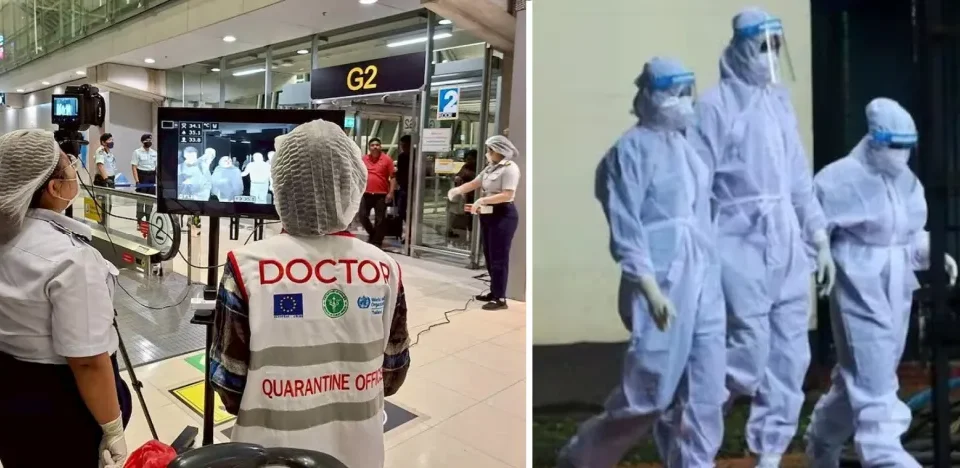Letter to Authorities 2.0

To, Whomsoever it may concern
Ref.:- 1. Supreme Court Order in the case of Jacob Puliyel Vs. Union of India 2022 SCC Online SC 533, Decided on May 2nd 2022.
- Bombay High Court order in the case of Subrata Mazumdar Vs. Dr. Vidya Yervavdekar, Principal Director of Symbiosis Writ Petition of 4486 of 2022 Decided on 13th May 2022.
- ( Add here mandating/ restriction letter reference )
Dear Sir,
- Kindly note that the vaccine mandates were challenged in Supreme Court by Dr. Jacob Puliyel through Adv. Prashant Bhushan. The order has now come and can be found in its entirety on the following links:
https://indiankanoon.org/doc/17990001/
https://awakenindiamovement.com/indian-supreme-court-judgement-against-vaccine-mandates/
2.Kindly note Bombay High Court Order in Reference No. 2 above in which respected judges referred Supreme Court Order and Symbiosis education institution had to take back vaccine mandate order and also agreed to give withheld salary with compensation.
Order link: https://awakenindiamovement.com/bombay-hc-order-reinstating-compensating-unvaccinated-employee/
3. As per Supreme Court Order in the case of Jacob Puliyel Vs. Union of India 2022 SCC Online SC 533, decided on May 2nd 2022 the following points are pertinent to our case;
“60. We have already referred to the material placed by the Union of India and the States appearing before this Court. While there is abundant data to show that getting vaccinated continues to be the dominant expert advice even in the face of new variants, no submission nor any data has been put forth to justify restrictions only on unvaccinated individuals when emerging scientific evidence appears to indicate that the risk of transmission of the virus from unvaccinated individuals is almost on par with that from vaccinated persons. To put it differently, neither the Union of India nor the State Governments have produced any material before this Court to justify the discriminatory treatment of unvaccinated individuals in public places by imposition of vaccine mandates. No doubt that when COVID-19 vaccines came into the picture, they were expected to address, and were indeed found to be successful in dealing with, the risk of infection from the variants in circulation at the time. However, with the virus mutating, we have seen more potent variants surface which have broken through the vaccination barrier to some extent. While vaccination mandates in the era of prevalence of the variants prior to the Delta variant may have withstood constitutional scrutiny, in light of the data presented by the Petitioner, which has not been controverted by the Union of India as well as the State Governments, we are of the opinion that the restrictions on unvaccinated individuals imposed through vaccine mandates cannot be considered to be proportionate, especially since both vaccinated and unvaccinated individuals presently appear to be susceptible to transmission of the virus at similar levels.”
4. The bench of judges who passed the order have made it clear in the following sections of the judgment that if the restrictions imposed to take away fundamental rights of people are not proportionate, then they are unconstitutional and illegal, relevant excerpts from the order are listed below;
21. We shall now proceed to analyse the precedents of this
Court on the ambit of judicial review of public policies
relating to health. It is well settled that the Courts, in
exercise of their power of judicial review, do not ordinarily
interfere with the policy decisions of the executive unless the
policy can be faulted on grounds of mala fide,
unreasonableness, arbitrariness or unfairness etc. Indeed,
arbitrariness, irrationality, perversity and mala fide will
render the policy unconstitutional
48. The crucial point that requires to be considered by us is whether limitations placed by the Government on personal autonomy of an individual can be justified in the interest of public health in the wake of the devastating COVID-19 pandemic. As stated, personal autonomy has been recognized as a critical facet of the right to life and right to self-determination under Article 21 of the Constitution, by this Court in Common Cause (supra). In K.S. Puttaswamy (supra), this Court laid down three requirements to be fulfilled by the State while placing restraints on the right to privacy to protect legitimate State interests.
While the judgment is in context of the right to privacy, the analysis with respect to the threefold requirement for curtailment of such right is on the anvil of the protection guaranteed to fundamental freedoms under Article 21, and therefore, would also be the litmus test for invasion of an individual’s bodily autonomy under Article 21.
Conclusion:
89. In conclusion, we have summarized our findings on the
various issues considered by us, below:
(iii) …However, in the interest
of protection of communitarian health, the Government
is entitled to regulate issues of public health concern by
imposing certain limitations on individual rights, which
are open to scrutiny by constitutional courts to assess
whether such invasion into an individual’s right to
personal autonomy and right to access means of
livelihood meets the threefold requirement as laid down
in K.S. Puttaswamy (supra), i.e., (i) legality, which
presupposes the existence of law; (ii) need, defined in
terms of a legitimate State aim; and (iii) proportionality,
which ensures a rational nexus between the objects and
the means adopted to achieve them.
5. All mandates issued by all Government and private bodies which discriminates between vaccinated and unvaccinated and which restrict any benefit or Services to unvaccinated people are proved as illegal, unconstitutional, arbitrary and violative of Article 14, 19 & 21 of the Constitution of India. Now no one can be compelled to produce RTPCR Tests only because he is not vaccinated. The status of vaccinated and unvaccinated is held to be the same. [Para 58 of Jacob Puliyel Vs. Union of India 2022 SCC OnLine SC 533]
6. All contrary judgments passed by any courts in India such as Gujarat, Karnataka, Kerala, Calcutta High Courts etc., and orders or directions given by any officials, Ministers or authority stands overruled even if they were before the Supreme Court or not. As per Article 141 of the Constitution of India this judgment of Supreme Court is binding to all authorities, Courts, private bodies etc. Other judgments are implied to be overruled.
[State Bank of Travancore Vs. Mathew K.C. (2018) 3 SCC 85, C.N. Rudramurthy (1998) 8 SCC 275, S.E Graphites Private Vs. State of Telangana 2019 SCC OnLine SC 842.]7. The ratio laid down by the Constitution Bench in Common Cause Vs. Union of India (2018) 5 SCC 1 is binding to all cases of vaccine mandates and any direct or indirect force or SOP which compels a person to get vaccinated for availing any benefits or services are prohibited. It is a choice of every person to refuse to get vaccinated or refuse any treatment which is suggested by the Government. No one can force them. No authority or courts in India can ask any person to give reasons for not getting vaccinated. It is integral part of fundamental right of each person under Article 21 of the Constitution and no law in future cannot be brought to take away this right. Article 13 of the Constitution is clear on this point.
8. The Conclusions of these judgment as per Point 89 says –
“(v) – ….In light of this, restrictions on unvaccinated individuals imposed through various vaccine mandates by State Governments / Union Territories cannot be said to be proportionate. ….. we suggest that all authorities in this country, including private organizations and educational institutions, review the relevant orders and instructions imposing restrictions on unvaccinated individuals in terms of access to public places, services and resources, if not already recalled.
9. In 1995 SCC (1) 259 M/S. Spencer & Company Ltd. & … vs M/S. Vishwadarshan Distributors … on 6 December, 1994, it is made very clear by the Supreme Court that even if their words in a judgment are in the form of an advice or suggestion and not an explicit command or direction, it is a judicial order and is considered binding and enforceable throughout the territory of India. Link to the said judgment can be found here : https://drive.google.com/file/d/1RhjS8La5m8wd1yfX_Ii9WYA6NkQfkiNI/view?usp=sharing
Hence you are hereby called upon to forthwith act as per law laid down by Hon’ble Supreme Court.
10. Needless to mention that the judgment of Hon’ble Supreme Court is having retrospective effect on all the cases of any individuals.
11. Hon’ble Supreme Court in the case of E.T. Sunup Vs. C.A.N.S.S. Employee Association 2004-CCC(SC)-4-295, has ruled as under;
“A] CONTEMPT OF COURT- Deliberate attempt on the part bureaucracy to circumvent order of court and try to take recourse to one justification or other- this shows complete lack of grace in accepting the order of the Court- this tendency of undermining the court’s order cannot be countenanced – in democracy the role of Court cannot be subservient to the administrative fiat – the executive and legislature and executive within check- the appellant office flouted order of this court is guilty of contempt of court.
B] PUNISHMENT TO BUREAUCRATS- apology tendered – order of court complied- held- if the court’s are flouted like this, then people will lose faith in the court- therefore it is necessary that such violation should be dealt with strong hands and to convey to the authorities that the courts are not going to take things lightly- order of the high court convincing the officer under contempt of court’s act and imposition of fine of Rs. 5000 is affirmed.’’
12. In Pramotee Telecom Engineers Forum & Ors. Vs. D.S. Mathur (2008) 11 SCC 579 it is ruled by Hon’ble Supreme Court that the act of authorities in misinterpreting the Supreme Court judgment is a Contempt of Court.
13. Hence, this notice. Please do the needful and stop further Contempt of Hon’ble Supreme Court and violation of fundamental rights of my client.
14. If we fail to receive reply within 7 days from the receipt of this notice by you, then my client will be constrained to file contempt petition and take other legal action at your risk as to cost and consequences.
Yours Sincerely,



